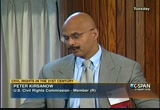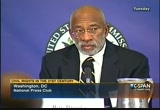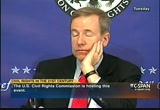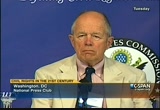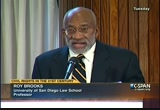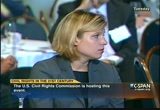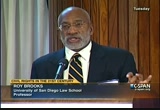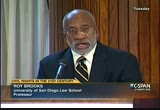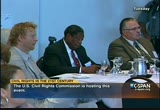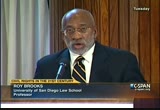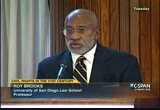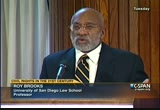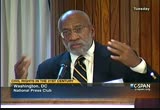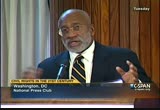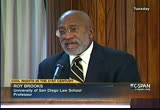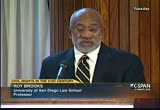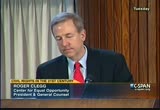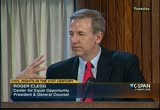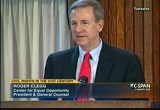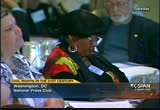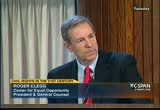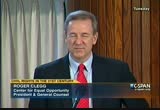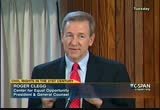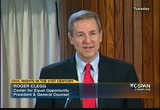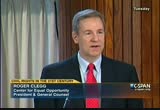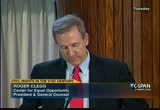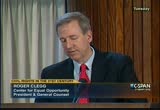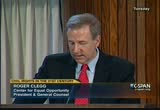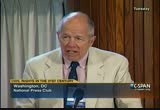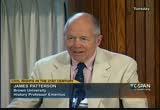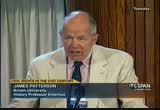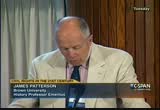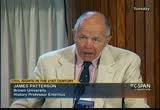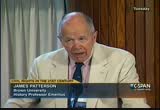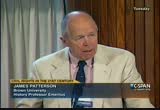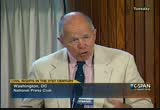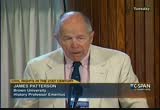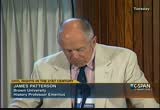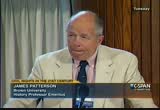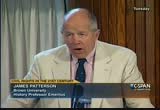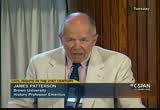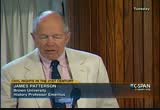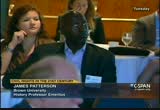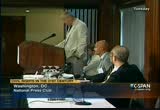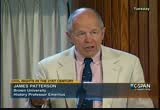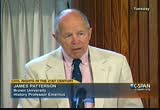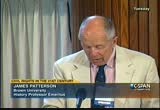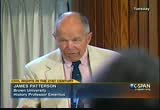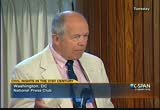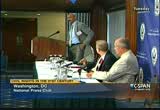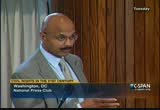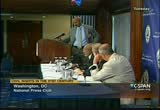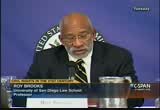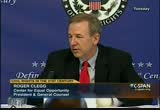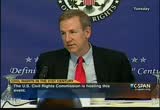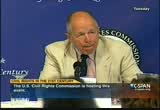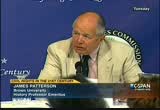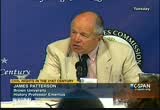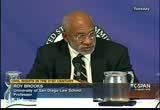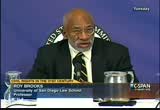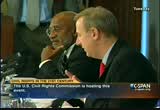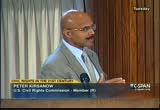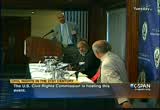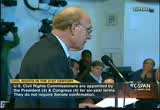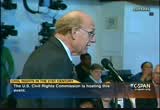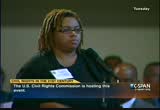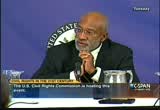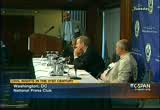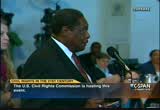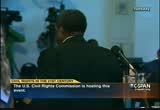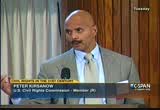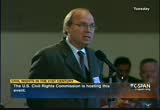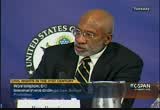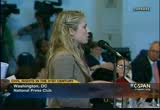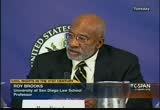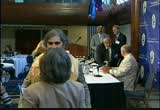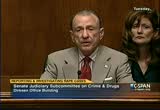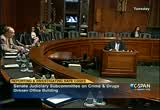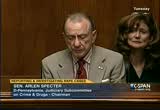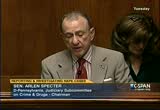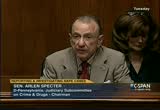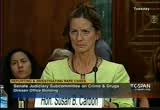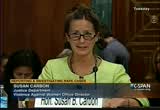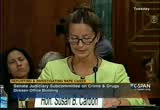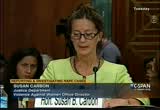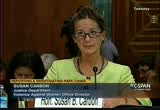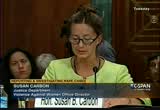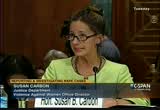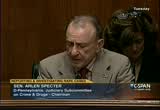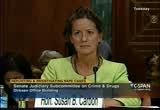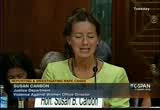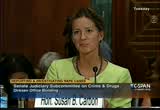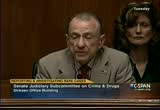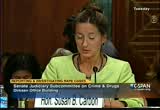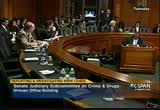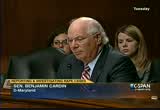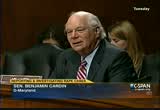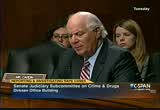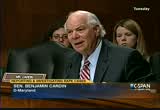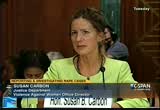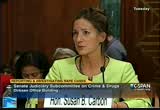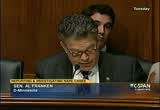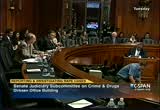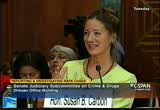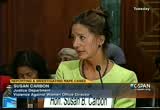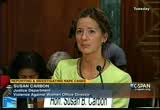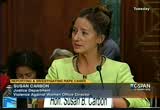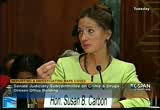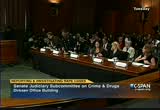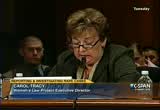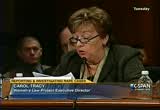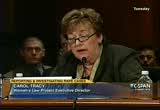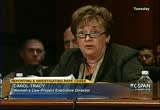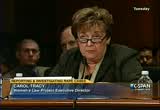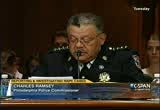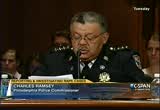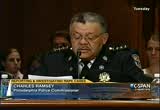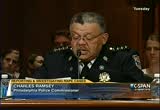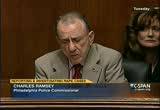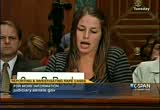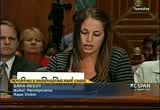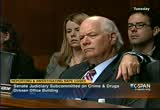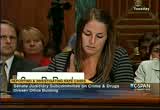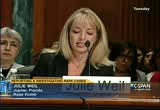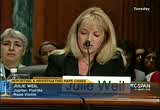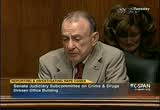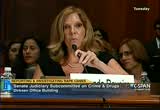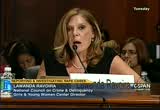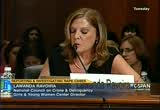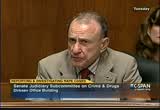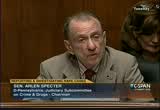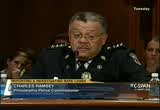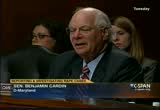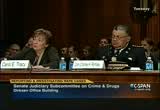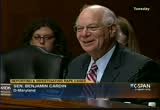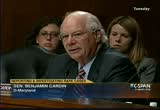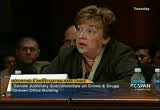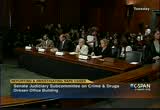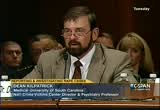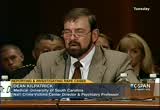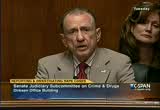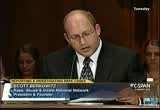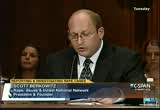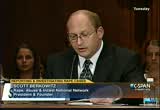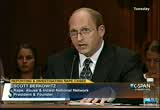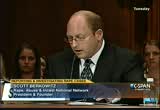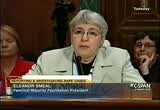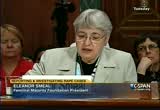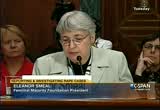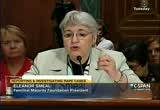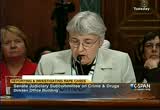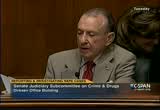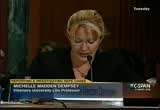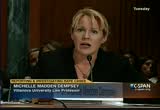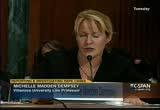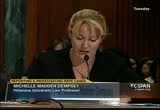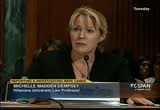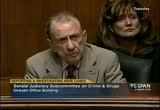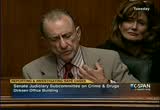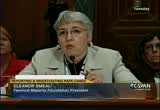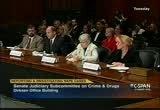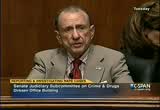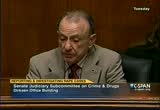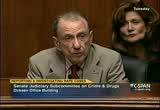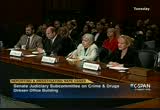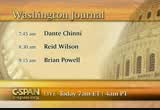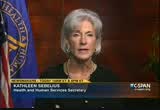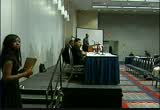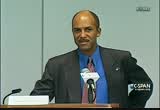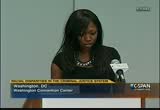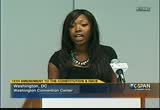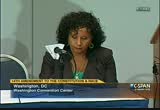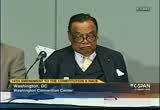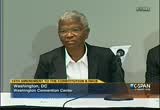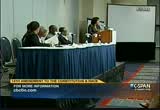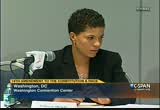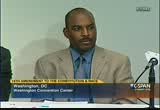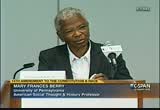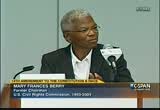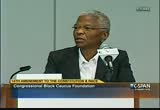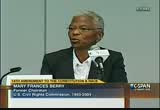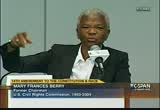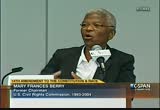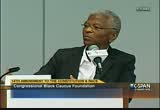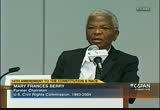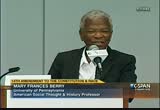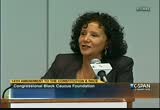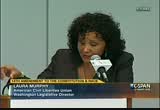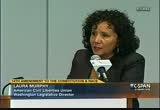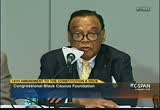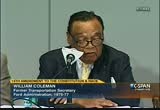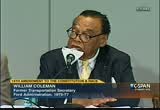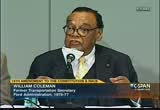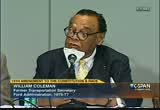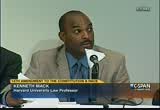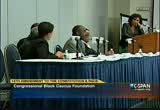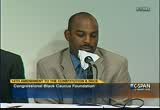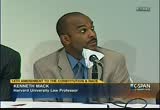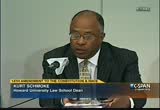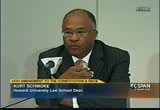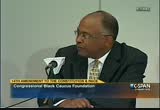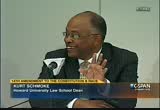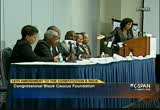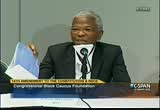tv C-SPAN Weekend CSPAN September 19, 2010 2:00am-6:00am EDT
2:00 am
to your going to hear on this panel will lead into a subject matter of the next panel dealing with family structure and frankly lead over into virtually every panel and may give some insight as to what should happen with respect to the civil rights commission the subject matter of the last panel of the day. our first speaker is professor roy brooks, at the university of san diego. professor brooks is the author of over 100 articles and chapters in 20 books and his latest book tackles the critical question of developing the best post civil-rights model theory. writer joining the university of san diego faculty professor brooks at a distinguished legal
2:01 am
career began with a federal court clerkship and was in a private practice with swain and more. the second speaker is roger clegg from the center of equal opportunity think tank devoted exclusively to promoting colorblind equal opportunity and ritual and before his work he had opportunity and a number of positions with the u.s. department of justice and putting assistant to the supreme court cases he was the number two man at the civil rights division at the department justice and the environment division and he also served as vice president and general counsel to the center for public policy where he batted it and wrote a variety of publications and legal issues of interest to business and he's contributing editor to among other things "national review" online and
2:02 am
writes frequently for usa today, the weekly standard, and several other periodic journals. finally, professor james patterson is the fourth foundation professor of history emeritus at browne university. he is a graduate of williams college and worked as a reporter for the harvard and summer, hartford current prior to joining harvard university where he received his ph.d. in history. his recent publications include grand expectations the united states 1945 to 1974 for which he received the bancroft prize in history be read about property, from the board of education, civil rights milestone and its legacy and most recently he will be discussing the subject matter freedom is not enough, america
2:03 am
struggle with a black family life from lbj to obama which provides a historical account of the moynihan report. the doctor of princeton was to join today but had an emergency to attend to and regrets she can't be with us. i will be in charge of for some time constraints, so don't take it against me if i look ruthless. i know sometimes with a moustache i do from time to time of. and with that, we will start with dr. brooks. thank you. [applause] >> thank you, commissioner. i have 15 minutes to cover a great deal of material, going to have at it. i want to begin where i began with my book, racial justice and the age of obama, and that is with a discussion of my fellow students at yale law school in
2:04 am
the early 1970's, and not many of us there at that time but we routinely discussed civil rights issues after dinner into law school cafeteria and some of the students for conservative such as clarence thomas now of the supreme course it is a more liberal, the leading critical race theorists today. we sat at a table we call the black table. in the book i describe the black table as follows: the black table wasn't a liberal or conservative table, it was a scholars tabled, we disagreed routinely but almost as often concede it to those arguments. we did not just half opposing opinions we also had knowledge and integrity which enabled us to walk away from the table as friends remained friends to this
2:05 am
day. at the risk of something presumptuous i would like to vote the black tables ambiance of civility and intelligence for today's discussion and i hope that we can give polite consideration to opposing points of view. this the only way i know how to play this game. let me start with a allegory of a poker game and this involves to individuals one white the other black and the game is in progress about 350 years. during this time the white player has been cheating and at the end of the three and a half centuries the white player stands up and says okay this day forward no more cheating we are going to play fair and square. the black player then looks up from the table and says great, i've been waiting 350 years to hear you say that but let me ask
2:06 am
what are you going to do with all of those poker chips that have accumulated on your side of the table? and i submit to you that today some 40 years after the cheating has stopped the key to understanding the nature of the problem of race lines in the poker chips, not racism nor in the class or culture. the poker chips represent financial human and social capital advantages of white society, deficiencies in the black society. but the poker chips in other words that define the american race problem today, defined american race problems today the american race problem in my view is properly defined as a problem of resource disparity between black and white americans. the problem relative to
2:07 am
african-americans is a problem of capital deficiencies in black society, financial capital deficiencies many income and property. human capital deficiencies meeting skills and education and social capital. deficiencies' meeting social, not self but social and the inability to get things done in our society. to be sure, african-americans on an individual level are experienced unprecedented racial opportunities and success today. it's no doubt about that. but the age of obama is also defined by a different racial dynamic and that is continuous, and interrupted racial despair for a great many african-americans. these contrasting racial
2:08 am
dynamics of individual success and opportunities in a kind of collective make defining the problem of race today very difficult so one can quite understand those conservatives who argue the best way to define the problem today is not to find it at all. that is to say it is not only the unprecedented opportunities afforded to black individually but it's also the death of jim-crow and the rise of the formal equilibrium and the hezbollah of the land believes these individuals to argue that we are in a post racial society. the problem we face the argue is one of culture and class. the problem consists of teenage pregnancy, broken families,
2:09 am
black on black crime, hypersensitivity to race and lack of educational ambition. liberals in contrast insist we still have a race problem today and the problem as they define it one of white racism for liberals they define the problem in terms of individual racism then institutional or societal racism, less in terms of racial antipathy than racial stereotyping. less in terms of french state reason them backstage racism. in my view both conservatives and liberals are wrong. the conservatives, the conservative conceptualization of the problem is wrong because flexible, college educated black men for doing everything conservatives say blacks ought
2:10 am
to be giving culturally and yet today the durham $20,000 a year of less than the white counterparts. at the end of jim crow, the beginning of the post civil-rights period, these black individuals earned $16 less than their white counterparts so the problem has gotten worse since jim crow, not better. the appendix to my book contains 100 carefully to and tables that measure financial, human and cultural capital deficiencies of all of the major racial groups since the end of the jim crow period. liberals are also wrong in their characterization of the problem because racism and discrimination have declined since the end of the civil-rights movement. 43% of whites voted for a black president that would not have
2:11 am
happened with the black table was in session. but the racial differentials and resource disparity pretty much remained constant since the end of the civil-rights movement. some instances have gotten worse. also institutions today are pursuing diversity like never before. there is one black partner in the law firm that told me diversity is a billion dollars a year business. the fact is if racism or discrimination ended today blacks would still have a problem to mauro and that collective problem is capital deficiency. now this is not to say the behavior and structure are irrelevant considerations. i'm not saying that in fact each provides an asset to buy consider to be the central issue of civil rights today and that
2:12 am
is whether the american race problem defined as resource disparities is sustained so far into the post civil-rights period by the internal factors of but behaviorist and bedle use within black society or by the external factors such race, racism, discrimination or perhaps even a corrupt american culture at large. that is the issue. in the book i repositioned the fury as a debate over that question into the debate is on for broad post civil-rights theories constructed from a synthesis of the major theories, have theories, suppositions regarding racial justice put forth since the end of civil rights movement. i sort of cover everyone from
2:13 am
the right to the left and in between. let me just give you what can only be an oversimplification of each series. the first theory is traditionalism and traditionalism basically argues that no longer matters in their area of about. the second theory is reforming. reformists in response to the traditionalists say race matters and yes there is black but what you but it's exogenous to. so the solution is internal and external. ford is limited subornation. unlimited separation says self-interest matters more than racism today that white americans especially young simply do not see pursuing racial justice to be with in their self-interest. the of to many other considerations so the best place
2:14 am
for blacks to find a helping hand is a the end of our own army. the fourth serious to critical race theory and the critical race theory says look, the problem of race is inextricably tied to power in our society, in sight of health, power, and that has been the case at the beginning of the republican. so you can't do anything significant about the race problem until you do something about the problem of power. ergo the solution as external and beyond the control of blacks. now why leave it to the reader and to you to determine which offers the best laid dresses and prescription for the american race problem. i take the position in the book but because i was forced to take it by my publisher i did not
2:15 am
want to take a position because i don't know. i simply do not know. and i think would like to see done is that we look at the issue the right way what i consider to be the right way and to try to come up with solutions that are going to be effective. with that my time is expired. thank you. [applause] >> first of all i would like to thank the civil rights commission for inviting me to president on the panel today. this is a terrific conference and a terrific panel and i really feel fortunate to be able to be part of it. i think today should be a celebration.
2:16 am
imagine you're legal and social status, your relationship legally and socially to other americans. white versus black, if you are in 1650. think about that for the second. how he would feel toward a person of a different race. what you're different legal rights would be, what you're different social status would be if this for 1650. okay? now, imagine that its 1950 how things are different in the way
2:17 am
you relate to the person next to you who is a different skin color, the way you relate to them as a legal matter and as a social ladder. okay? its 1950. think of that. what that would be like. okay? and now, think of what it's like in 2010 today. think of how you relate to a person of a different skin color with different legal rights, different social status of the way you relate to that person in 2010. now if you can honestly do the exercise and not feel good about
2:18 am
where we are in 2010i don't think you're being honest. this country has done great stuff in the past three or 400 years when it comes to race relations and i don't think we should lose sight of that picture today as we go through the remaining challenges that we face. when we ask ourselves what we need to do with respect to race relations and i'm going to simplify things and talk about black and white i will say more about that in a minute. but where do we want to end up? i think if you are analyzing sort of what's wrong with where we are and what needs to be done
2:19 am
you need to give fought on where do we want to in that? how should blacks and whites be related to each other? where do we want to be ultimately? i don't think anybody expects americans to be totally colorblind. we just don't recognize at. i don't think that we expect african americans to forget that they are african americans, they have a different heritage than somebody from ireland or in -- italy or someplace like that. but i think that a realistic goal is for being african-american to be like being irish-american. you can be proud of being a irish-american. you know, you certainly don't
2:20 am
try to hide or ignore that background. it's something you've may celebrate the be more than once a year on st. patrick's day but that's all fine. certainly shouldn't affect what your rights are or how you are treated by other people. we don't expect all americans to eat the same foods and listen to the same music but we do expect a certain commonality of interest and respect among one another. and i think that's where we want to end up. okay so are we giving them if that is where we want to end up? how are we doing on our
2:21 am
treatment of african-americans? a degette is useful to divide into three parts the ways in which we have fallen short and then asked how we are doing now in 2010. first and most obvious is the law. and i think that everybody would agree we don't want to have a legal regime that supports people according to scholar and what country their ancestors came from and treat people differently, some better and others worse depending on which box the check. and we've done pretty well on that. in fact, not only do the laws
2:22 am
not -- does the government not treat people differently on the basis what box the check but ironically on the exception of affirmative action which i am not going to dwell on today but otherwise the law does not make those kinds of distinctions. to the contrary, it prohibits private individuals and corporations and universities and so forth from engaging in that kind of discrimination and just about any public transaction whether we're talking about education or contacting or employment or voting or public accommodations or credit. you know, you name it, that kind of discrimination is illegal. you can't do a. the second big area is prejudiced. forget with the law says. how do americans treat one another? again i think we have made huge
2:23 am
progress. i don't think that anybody believes or asserts that there is no discrimination, there is no prejudice. that stream isn't dry and it will never be tried. there will always be prejudice, people will fall colors some of them will have prejudice of one kind or another. but i think there again whether you look at public opinion polls or other kind of data the progress we have made is enormous. when my son started college he plays ice hockey and one of his -- one of the guys he was living with, one of his roommates was
2:24 am
white and was dating a black girl and we met two of them, the couple was dating and later on we met paul, my son and i told him we met your buddy and his girlfriend. he said he met her? he said i don't know if i would want to date someone like that. and my wife and i sort of said what do you mean the? and he said well, you know, they are both on the track team i think it would be awkward to be dating somebody, you know, for
2:25 am
instance to date somebody on my hockey team. and he said maybe it's a little bit different because track and field or not exactly -- you're on the same team but you're doing completely different things, maybe one person is a pole vaulter and one is a hurdler. so that's the way the conversation went. and i was the big issue for my son and this is southern virginia. okay? i should also say everybody involved in this story was republican. [laughter] including the role of charlie had like the president a white mother and a black father. the father was a republican appointed judge. but anyway i think we have made enormous progress. so the question is why does it still affect?
2:26 am
do white parents secretly droll the shades and instruct their children this is the way you should think about black people? they are really not the same as we are? is that what happens? i don't think so. to the extent that we still have prejudice, it is said by phone third problem which is racial disparities. you know, we have disparities in crime, in poverty, education and it's unfortunate people do make generalizations based on that. they don't need anybody to tell them that this or that group has a high rate of crime. jesse jackson, you know, the famous story, admitted when he is walking down a dark street
2:27 am
and you're behind him and he sees a couple of white kids and black kids he seems relieved. i think these disparities are part of the remaining problem that has to be addressed. i hasten to say i don't think we should expect there to be no disparities and anything for all of time. there are always going to be some differences among the racial and ethnic groups and how many become lawyers and how many decide to become doctors and how many decide to play football rather than basketball rather of an ice hockey rather than track and field, as we don't expect them to be perfect demographic balance in every walk of life.
2:28 am
2:33 am
over time i, like so many other professors, moved into teaching and writing black history. i ended up writing a book on the brown versus board of education case. and most recently, the book which i suppose got me invited here entitled "free throwdom is not enough." i mentioned this so that you may go out and buy it.
2:34 am
it appeared with minimal fanfare last spring and is as the title suggests, a book about the mccain hand report, what it was, what happened to it and whether or not it has any relevance to race relations today. so bear with me while i tell you a little bit about the report. >> it appeared in the spring of 1964, was located over the summer and became known as the moynehan report. it's actual title was "the negro family, the case for national action," and it did
2:35 am
not bear his name on the cover. but it was his document. he wrote it, and it stemmed from his concerns. moynehan later went on to become a four-term senator from new york state and was replaced by hillary clinton in 2000, and he died in 2003. the arguments of the moynehan report -- i am going to be brief with it because most of you probably know. these were very liberal arguments. moynehan was a great fan of kennedy, which first brought him into the labor department in 1961. he was a liberal democrat, an irishman from new york city. he really believed that government could make a difference, which as i see it the central tenant of what liberalism means to most folks today. he said the problem facing the
2:36 am
negro family was there was a racist virus in the american blood stream, that is a quote, which caused, three centuries of unimaginable mistreatment and which appeared most obviously in the weakness of the lower class urban black family. he made it clear that he was not saying this was true of all black families. but this led to an out-of-wedlock birth rate in 165 of around 25%. the word used then was illegitimate's. he talked about a black make remarky, and in particular
2:37 am
drawing on some language from kenneth clark, whom he had consulted and wrote the book "dark ghetto" in 1965. he was a black psychologist. he referred to it as a tangle of pathology, i.e., a sickness that was really dragging the lower class black family down. moynehan's report got to lyndon johnson, although we don't know whether he read it. but he certainly read of it and was told of it by bill more and others in his administration. whereupon he asked moynehan to write a speech that he, johnson, was going to give at howard university on june 4th, 1965, a speech that many people said was the greatest civil rights speech johnson ever made , in which johnson made clear
2:38 am
following the moynehan report, that legal equality, which he said was being achieved by the civil rights act of 1964 and would be furthered by the soon to be passed voting rights acts of 1965, the united states had to move beyond conferring or guaranteeing legal equality to doing something about social and economic conditions. that is, to promote social and economic equality. for americans. as i say, johnson gave this speech. it received a fair amount of attention. he said in there freedom is not enough, from which comes the title of my back -- book, and that one had to move into a whole range of social issues. moynehan's major thought at
2:39 am
that time about what to do about this was to do something to turn around the situation of black men, for which he was later hammered by feminists. in 1965 you will remember, and we historians really urge you to remember what the past was really like. feminism wasn't a big deal. the equal employment opportunity commission was not in fact created until july 1st of 1965. fits first chairman, franklin d. roosevelt, jr., was not at all committeded to the project, which is one of the many things which led women, offense, who were also guaranteed equality by the civil rights act of 1964 to form in 1966. the moynehan report, as i say,
2:40 am
was a hopeful document. moynehan thought that the real answer was to do something to provide greater employment opportunities for black men. presumably, although he did not spell it out in his report -- in fact, although the subtitle was the case for national action, he was unspecific, something for which he was also hammered. critics said well, you are saying all these terrible things about black families, but you don't tell us what to do about it. moynehan's answer to that was this was an internal document. he wanted people in the administration to fully understand what was going on, and we would sit down and seriously figure out what to do instead of rushing into some ill-conceived legislation. but i think his goal i think was to provide greater employment opportunities, probably something like the
2:41 am
works projects administration of the new deal which provided government employment. he also had in mind all the way through his life as an irish catholic who understood european social programs a system of family allowances by which all families would receive allowances for their children, whether the families were rich or poor. this is a system of allowances which exists today in many western industrialized countries, including canada, from which i've just returned from a fishing trip. these are modest, but they do not discriminate against rich people who happen to have kids. they go out to everybody. therefore, there is no stigma. there is not a great deal of bue catic half. the money just goes out. he also believed strongly in birth control. here he broke with his
2:42 am
religion. as you know, the moynehan report rain into a hailstorm of criticism. i haven't time to go into all of this. there is a woman over here who raised a sign and told me i have x number of minutes. i will trying to make it quick. it is one of these unfortunate coincidences. in the first place, johnson escalated the roy in july of 1965, which -- war in july of 1965, which caused a fracture in the democrat party coalition. they wouldn't trust anything johnson wanted to do. secondly, the watts riot occurred on august 6, 1965 and lasted for five days and received enormous television coverage. this scared a lot of white people who had supported until that time, unless they are
2:43 am
liberals, an interracial civil rights movement. they said maybe they are just aren't abused discriminated against, church-going southerners. now these are angry black urban kids who are destructive and don't deserve help. it also greatly changed the civil rights leaders, who were almost as surprised as johnson was. he kept saying why are they doing this to me? you know johnson. he assumed everything was either his fault or the result of what he did. many back leaders then realized that they had to catch up with the militants of the masses in the cities and to take over control of the civil rights movement. this led of course to black power by 1966 and the essential
2:44 am
ejection from snick and core of white participants. they looked at the moynehan report as a harsh and judgmental description, a tangle of pathology remember, of black lower class urban culture, and they wanted nothing to do with this white irishman who was telling them how to run their families. johnson, by then wrapped up in escalation of the war, angry at these black leaders -- after all, johnson felt he had made it possible for the civil rights laws of 1964 and 1965 to pass. basically consigned the report to oblivion. as other people have mentioned
2:45 am
this morning, we endured maybe 25 or 30 years of non-debate or dishonest debate over what were the problems of black lower class families. moynehan, in an essay that he wrote for commentary magazine in 196 reflecting on this, felt bruised by this. he was called a racist and had a hard time ever getting over what had happened to him. he referred to this change of direction from the howard speech of june of 1965 to the mood in 1965 and the black power mood of 1966 as a moment lost in american history. historians are always interested in turning points. was this a moment lost?
2:46 am
if something had been done to follow up the moynehan report by the johnson administration as had seemed to be likely, would things have been different? i don't think so for reasons i will suggest, but certainly it seemed that way to him. >> the out of wedlock situation today is around 73% of black children born that way. in 1965 the rate was 25%. so it has gone from 25% to 73%. it has been around 70% for around 20 years now. it went up in a hurry. one wonders, and it probably
2:47 am
can't get much higher if you think about it. the white rate, which was 3% in 1965 compared to 25% for blacks , has gone up to 28% to 29%. it has gone from 3% to 2%, and the black rate has gone from 25% to 73%. the white rate has grown faster, but the gap is huge. one asks why such increases? we have heard from some of the other speakers that things are a lot better today than they used to be. well they are not better in this regard. they are much, much worse. i agree with him in saying there is no single greater problem affecting black america than this. why such increases?
2:48 am
well, i haven't time to go into this either. read my book. [laughter] that is a second plug. that is what professors do. nobody reads our stuff. so when we get a chance to talk, we do. the answer is a combination of economic and cultural forces. the economic forces which have been especially stressed by black scholars and white scholars, the most empenant being women julius wilson, who has written a number of books on the subject, talking about the deindustrialization of northern and western cities, which had previously provided something like a stable income for blue collar black people, created larger unemployment. the second is cultural forces or rights consciousness, or what the author who was a
2:49 am
johns-hopkins professor who wrote a book called the marriage go-round, referred to it as expressive individualism. this was a by product of the civil rights movement. another cause of this was the greater affluence of american society and the incredible materialism of american society, people thinking they have a right to do what they want, that they have a right. this is what he calls expressive individualism. i have called it in some of my books rights consciousness. this has occurred throughout the industrialized world. numbers such as i've described exist in all western countries. not japan, but all
2:50 am
industrialized western countries. if you put the 73%, 5% rate, and there the hispanic rate. they are around 50%. the overall average is 41% of all children in the united states today are born out of wedlock. the vast majority of these children grow up in fatherless families, which there is nothing wrong with that. women can raise kids. but most of those families are desperately poor. you know the subject. you don't have to have me explain it. it is pretty clear. this is part of a worldwide situation in industrialized countries. there are other countries in fact who have rates higher than our 41%. but none comes close to the black rate in the united states of 73%. what can we do about it, and i
2:51 am
will close with this? have you raised your sign yet? >> yes. >> ok. well, i close with some comments as others have in the media about the reputed success of the harlem children zone, which is a holistics program, as some of you know, which deals with mothers when they are pregnant. it has preschool and pre-preschool. it has counseling, health care. it is reasonably well funded. obama pushed for this and during the campaign of 2008 and since. i mentioned this as a promising doufment. a promising development. what is happening there requires massive resources. it is very hard to duplicate to keep up. a lot of fundraising takes place all the time.
2:52 am
the teachers work hard and there is the possibility of burnout. so whether a massive expansion of programs such as that will really happen or make an enormous difference is hard to say. my final point is that government cannot stop people from having children. so i conclude, i guess, as mr. klegg does, by saying i don't know what the answer to this problem is because it is both economic and cultural. because it is international, and because it is especially problematic for blacks. let me finish with a quote. this is from the white social scientists christopher jennings and he willwood, who are experts in the policy.
2:53 am
this is a discouraging note, so you had better take your flask out. they said that changing long range trend in family structure is like dealing with the weather. we understand, they said, the weather far better than we used to. but while better understanding has produced better forecasts, it has not produced better weather. and for those who want to alter family structure, we can offer only one bit of advice. treat anyone who claims to know how to do this with a high degree of accept sism. thank you. [applause] >> thank you to our panelists. i'm going to jumpstart the
2:54 am
questioning with a few of my own. probably the first and most important one that i think most of you want to know the answer to, the most profound is to professor patterson. how many fish did you catch in canada? >> some big ones. >> ok. [laughter] >> this is to all the panelists. the title of professor patterson's book is freedom is not enough. and professor brooks talked about the 350 years of cheating by whites, and then the black poker player says well, ok you have said there is going to be no more cheat are, what are you going to do with all the chips now. we are now after executive order 11246, webber, gruder, 40 years into affirmative action. as i believe it was professor
2:55 am
brooks made mention of the fact that the national education progress scores are now starting to expand. that is the disparities between blacks and whites, while stabilizing for a moment are expanding so that 90% of black 17-year-olds have the reading skills of the average white eighth grader. and the average black 17-year-old has the academic proficiency of the average white eighth grader. if freedom is not enough, what is the prescription? is affirmative action the prescription? what would you do to get blacks and other minorities up to the starting line with whites and asians academically? >> well, that is the question. i think it is some combination of internal annex ternl factors
2:56 am
. i think that is how you have to approach it. i don't think african-americans can do this ourselves, and i don't think african-americans can rely on government to do it. it has to be a joint project. he talks about the harlem zone, and i write about it in my book. it is wonderful what is happening. but that is really sort of like a total family makeover. they start from preschool all the way up through high school, and there is a tremendous amount of internal pressure put on parents in the program to toe the line. maybe that is what needs to be done. there is one theory who believe that is the only way to resolve this, that african-americans have the primary responsibility , if not the resources to do
2:57 am
this. so it is some combination of the two. i would like to see more experiments like the harlem children's zone, and kip academies as well as other experimentation? >> let me begin by saying that i don't like the poker game analogy. >> why? >> and let me explain why. my memory may be wrong, but i think that our keynote speaker wrote a column one time -- and i've seen this analogy used more commonly. it is not poker players, it is football teams. one team has been cheating the whole first half and they have announced in the second half that they are not going to cheat anymore, and is that enough? if i were an academic, i would characterize this as racial
2:58 am
anthropromorism. >> the people who are playing poker now are not the people who were cheated a long time ago. they share skin color, but they are different people and individuals. now that doesn't mean that the playing field is even now. it is not level. but, there are people of all colors at both ends of the playing field. you have some african-americans who maybe their ancestors were not cheated because they didn't come over until after slavery. and you have more poor white people in the united states than poor black people. the point i am making is that when we talk about social
2:59 am
programs -- and liberals and conservatives can argue about what programs are going to work . i think it's a mistake to focus on race and have the programs be race tested rather than means tested. as pointed out, there are plenty of white kids now in addition to hispanic kids and asian kid who are caught in this tangle of pathology that moynehan identified. if we are going to have social programs, i think that they should be available to children of all racial and ethnic backgrounds. and conversely, if you are well off, even if you are
3:00 am
african-american, these programs should not be something that you automatically qualify for just because you happen to have a particular skin color. >> professor patterson? >> well, i guess i already suggested that harlem kid zome is a pretty good idea. they not only deal with pre-school children, they also try to help pregnant mothers understand some of the problems of who are mood. ÷???ñ?
5:00 am
the center promotes increasing the numbers of women in all ranks of all areas both to promote equality for women and to promote police response for violence against women. i'm going to sum rise my testimony and i'm going to, i'd like to submit the whole testimony and the record. >> without objection, it will be made part of the record. >> thank you very much. and i'm going to skip over the prevalence of rape since so much has been said about it. but i want to underscore which was just said by mr. berk wits about the fact that so many are incarcerated. in fact, according to one study, it's less than 1%. so let's keep that in mind. not only that, the undetected rapists tend to be serial rapists. and this is -- two shocking studies reveal that essentially for rapes being commited the
5:01 am
undetected rapists were serial rapists. most rapists were serial rapists and they were commiting the bulk of the rapes between 9 5 and 91%. this is why it's so important that they're processed. and i know that's not the feature of this hearing but it is just one indicator of the need to further investigate rape. because if you process the kits and because of the nature of serial rape, you would be finding people who are now going undetected and who will rape again. another major point is that 75% of rapes are done by people probably about 75% that are acquaintance rapes. but that is not to be minimized
5:02 am
, because, again, there's patterns. and these women who have been singled out, they will single out other women. research shows that nearly -- the vast majority of rapes today involve both subduing the victim by alcohol or drugs. now, the reason i'm pointing out all these things is that it will tie into our recommendations of what should be done with the uniform crime report. in talking about the need to recruit more women in policing, studies show that in fact there is a culture in the police department that must be changed towards women. and i've worked on this problem for nearly four decades. and we have just not made much progress. women are still only, according to the latest reports, about 12% of police zpts and 15% of the large police departments. i'm now going to skip because time is running out, to our
5:03 am
recommendations. the uniform crime reports should include things it currently does not on rape. in fact, it's carnl knowledge. so it's admitting oral rapes, ainl rapes, -- omitting when the victim is unconscious. it's almost ridiculous. it doesn't include rapes of men, it doesn't include rapes of homosexual rapes. now, let's go on to the victimization study. it doesn't include children under the age of 12. and that is a large category of rapes, about 25%. the federal guidelines also should be issued on how you
5:04 am
determine unfounded cases. it's very definite what is an unfounded case but we know that police are essentially calling something as unfounded which then, if the person is found to be a serial rapist, it is harder to prosecute them for the ones that are unfounded because it is believed that it was baseless or that the victim was lying. and so this actually compounds the problem. i believe, and we believe, that one of the most important things is federal guidelines and federal programs should encourage the recruitment of women police officers. and there's many ways of doing it, and also encourage the recruitment of police officers with specialized training in nursing, social work, and in dealing with sexual assault. and, of course we think that the violence against women office should be -- funding
5:05 am
should be increased. >> how much more time will you need? >> i'm ending right now. especially in the last 8 years funding has been decreased. so we know many changes should occur but we've got to start with changing the definition of rape which is contributing to an underallocation of resources. >> doctor kill patrick, you mentioned the issue of suicide, the only person to do so. can you amplify your concerns there to what extent is that a problem with rape victims? >> well, women who have been a victim of rape are about ten times more likely -- i have to turn to professor dempsey. and i was so busy reading her background, i left her out. very distinguished background. >> thank you, senator. >> associate professor,
5:06 am
university lecturer law and tuetorle fellow at oxford university, college of london, and teaches courses involving feminist legal theory. we'll come to that but first your testimony. >> thank you. and thank you for convening this hearing. going last after so many distinguished and experienced witnesses leads me to a position where, first, i want to say that i agree. and i'm going to try to say something that perhaps we haven't touched on quite as much. before addressing specific issues, however, i wish to place our discussion into the larger context of the criminal justice system as a whole. the failure to report and investigate rape cannot properly be understood in isolation from failure to take rape cases and take them to trial, failure of juries to convict, and failure of judges to impose adequate conviction.
5:07 am
survivors will fail to report if they believe their cases will not be taken seriously by the police. police will fail to investigate if they believe prosecutors will not pursue charges in court. ross cutors will not pursue charges if they believe that juries are unlikely to convict. and, moreover, the entire system and the culture in which the system operates will take rape less seriously when the sentence is cast by judges do not reflect the true gravity of the offense. all this is to say that the topic of conversation here takes place within a broader culture and a systemic failure not only of the criminal justice system but the issue of rape as a whole. i would like to discuss the issue of investigation. i think, as the judge rightly noted, the model that's going on in philadelphia right now is a wonderful model not only
5:08 am
because it increases accountability and it assists victims to obtain justice but because it respects the rule of law. this is the matter of the principle of leeth that the states should be accountability to the people. and what's going on in philadelphia is not only outstanding in philadelphia, and i'm proud to be a pennsylvaniaen. it is a model for the rest of the country. with respect to the issue of police misclassifying rape and other sex crimes as noncrimes, i'd like to differentiate two issues. one is the question of the ucr definition of rape, which as i think we can all agree is ridiculous. it is ar cake, it is old fashioned, it is insulting. and it doesn't capture the broad majority of rapes. so that's one issue. obviously we're all in agreement and singing from the same hymn sheet. in addition to that, as i commented in my written testimony and i would hope that
5:09 am
could be offered into evidence as well, there's real problems with the handbook of the ucr. the only illustrations of rape provided are stranger rape and gang rape. there are no illustrations provided to reflect the reality of acquaitance rape or intimate partner. and that suggests not only the definition but that the handbook needs to be rewritten, for this. also, so that's one issue, definitions in the hand book. there's another issue, coding, which is the problem of police unfounding rape cases. this is the problem of coding with the ucr. the ucr program actually encourages police officers to unfound cases. it does this by limiting the range of categories in recording case dispositions. there are only three options available to recording a case disposition under the ucr
5:10 am
program. one is unfounded. which is to say no crime has occurred. the other is cleared by arrest. which again, by definition, is to say that an arrest has been made and the case has been forwarded for prosecution. and the third option is cleared by exceptional means. which is, by definition circumstances which preclude prosecution. for example, the death of the defendant or inability to extradict the defendant. there are two major problems with the coding that i'd like to call to our attention, and ask this be added to your letter to the f.b.i. so they can take this into conversation as well. and that's, one, that with respect to the issue of clearing a case by exceptional means we cannot include the fact that the victim has withdrawn her cooperation a from the case as a reason to clear the case from exceptional means. victim noncooperation does not legally preclude the state from going forward. the state prosecutes crime, not the victims. the ucr sends exactly the
5:11 am
option sit message to -- opposite message. secondly, i think it's worth considering the possibility of adding a third way of disposing of a case, adding a disposition which reflects that the case was founded but was rejected based on inadequate evidence. now, i think that's something worth further debate, but i think the problem with unfounding cases is not only a problem of police misconduct but the structure of the ucr program and the way it encourages officers to unfound cases in order to clear them. thank you. >> thank you professor dempsey. doctor, i was on the question of suicide and the question to you is to what extent is that a problem for rape victims? >> well, it's difficult to look at completed suicides in the type of research that we do because we're talking to people who are still alive.
5:12 am
but if you look at attempted suicide, in both of the studies that we've done with national probability -- >> how about a correlation tweep people who commit suicides and those who have been rape victims? >> unfortunately, most rape goes undetected for the reasons we talk about today so we don't know about a lot. >> what about the rapes that are detect snd is there any sequence if not causele connection? >> people who have post traumatic stress disorder, as the military is finding out, are much more likely to make suicide attempts. rape victims are more likely to make suicide attempts than comparable women who have not been raped. my professional opinion is that there is some score lation there. >> you talk about changing the culture. how do you do that? culture of police departments. >> one, i think that you change
5:13 am
the educational requirements. and i do think that people who are trained in sexual assault, who are social workers, nurses, people -- >> how do you do that with police budget? >> well, unfortunately, social workers don't get paid that much. do they? >> social, talking about education. >> what i mean is that, as i said, a graduate of social works class does not get paid that much. but i also think that >> >> -- >> >> how do you increase the nonl of culture talking about social workers, and is that realistic? >> yes, i do. i think it's very realistic. because i do not think the average social worker makes as much as the average police officer. and i also think that we have to do something about recruiting more women into
5:14 am
policing. we have been suing the women's right movement as individual women the pervasive patterns of sex discrimination for 40 years and we're still only 12% of police officers. >> sorry to move on but time is very limited. what would your recommendation be about trying to get more sensitivity with the inter viewers, the police officers? how do we do that in a practical sense, given the limitations of police budgets and some -- it's so difficult to recruit people who have a vast educational background in this kind of matter? >> i think the training already exists. i think a lot of police departments have made a lot of progress on that and have implemented good training and in the way they handle this. so there's a lot of training
5:15 am
that are offered. >> i note among your courses you teach feminist legal theory. what is feminist legal theory? >> you should come to my class. we'd be honored to have you. >> do you meet on weekends? >> we'd have a special session if you wanted to attend. it's a question of basically evaluating existing law, legal doctrine. not only deposited law in the books, as we say, but law in the broader sense. the thing that is we should see to when organizing our world. when it has been made positive law, or not. so we evaluate both existing laws, and from a feminist point of view. >> what would your advice be to women's organizations to persuade police commissioners other than commissioner ramsey
5:16 am
to allow for transparency and allow for stake holders to be involved in reviewing these cases? >> i think there needs to be a context in which these people can sit down together. i think that literally just being in the same room and talking to women face to face begins to break down some of the myths that each side holds. i'm an unusual bird because i'm both a feminist activist and former prosecutor and i married a police officer. so you can bring these groups together, and in my own experience we are very successful in getting the police on board with more aggressive domestic violence and prosecution simply because we sat down and met together and talked about our concerns and educated the advocates and police officers regarding the concerns. >> thank you very much. this is a subject of enormous
5:17 am
importance, and i regret that we have not had more time today to do it partial justice. we haven't begun to scratch the surface. we have had very distinguished panels. it's insufficient to say you have five minutes, insufficient totally. snargets -- senators interrupt because we only have a few minutes to question. but that happens to supreme court nominees as well as you folks here today. it happens to everybody. it is my hope that we will stimulate some interest by police departments on this subject. there are a couple of things we can do. i think we can get the f.b.i. to change its definition. we can get the f.b.i. to change its survey.
5:18 am
we have oversight of the f.b.i. from this committee and i think the director will respond. there's a lot more to rape than is in that f.b.i. definition as outlined it totally eliminates the issue of what's going on in jails today across the country on same sex rape. and the issue of training, it would be good to get some federal funding incentives to police departments. i commend what you've done, commissioner ramsey. and i would like to see more police departments do what you do, and i'd like to see more women's organizations knocking on the doors. knock on their doors. knock on their doors. and if they don't respond, knock on the mayor's door. and you don't have to knock on my door. you can just tap on it.
5:19 am
5:20 am
american values, live at 7:00 a.m. eastern on c-span. >> today on "newsmakers," health and human services secretary talks about what could happen if republicans win control of the house. >> they could do some serious harm to what is now begun, which is a major change in the rules of the road. so the power is beginning to shift from insurance companies to consumers and back to doctors and their patients. we have announcing this week, these major consumer protections which will finally be in place and have been talked about for decades. companies won't be able to rescind policies any more, dump somebody out of the market because they got sick and they found a technical error.
5:21 am
they will no longer be able to say to parents to a child with a preexisting condition, we're not going to cover the treatment at all or to cover the treatments they need to get better. they won't be able to stop treatment because somebody hits a lifetime cap. and while that applies to a very small number of people, those are sometimes life and death situations. we'll have a focus on prevention and wellness which providers are thrilled about because what they know is too many people skip cancer screenings and mammograms. they don't get the full immunizations for their kids because there's still a financial barriers. so the outreach is important. and i think what the republicans will be faced with is really taking those benefits away. they will have to face their constituents who have their children enrolled on a family plan and say, you know, that can't happen any longer. >> you can see the entire
5:22 am
interview with health and human services secretary on "newsmakers" today at 10:00 eastern and 6:00 eastern on c-span. >> every weekend on c-span 3, experience american history tv starting saturday at 8:00 a.m. eastern. 48 hours of people and events telling the american story. historic speechesly national leaders and accounts that shaped our nation. visit museums, historical sites, as history professors and his attorneys dell f into america's past. >> now, from the congressional black calks foundation's annual legislative conference, a discussion on the 14th amendment to the constitution. this is just over an hour and 35 minutes.
5:23 am
>> good morning. we have the pleasure of welcoming all of you today to our panel on the history and centrality of the 14 ds amendment. we would like to start the panel today by introducing a recent law clerk for judge keith of the sixth circuit who is an historian with respect to the 14th amendment and his foundation supports education
5:24 am
on the amendment as part of the civic understanding of all americans. so i would like to give the podium to mr. ms. jer on mo to give us an outline of the keith exhibit. >> good morning, on today's topic is being presented by the keith collection and congressman john conyers, junior. today's panel commemorates the exhibition of the march toward justice exhibit at the legislative conference this weekend. the marching towards justice exhibit is the inaugural exhibit of the law collection which was started as a central repozztri for african american legal history. the marching towards justice exhibit focuses on the 14th amendment and the struggle to
5:25 am
make the united states a true democracy. the 14th amendment was established in 1868 but it was not enforced for african americans until the late 20th century. it was established to define what it means to be a citizen of the united states. our distinguished panelists will discuss the historical significance of the 14th amendment, especially in light of recent challenges to its continued relevance. at the conclusion of the discussion thereby will be tours which of the display. i'd like to thank our sponsors on first the interactive game counsel which helps today's program, including the gm foundation which has enabled the exhibit to travel all around the country. i'd also like to acknowledge
5:26 am
the cure rator for the exhibit, bob smith, who created the exhibit and was the brains behind the exhibit. [applause] now, please join me in welcoming laura murphy who will be serving as today's moderator until we expect mr. williams to arrive. on february 8, 2010, laura murphy returned to the aclu office to serve as its director. prior to her return she directed her own firm, laura murphy and associates, where she utilized her 30 years of policy making and political expertise to guide and advise corporate and nonprofit clients at the national state and local levels. murphy is well known for her legislative advocacy on human rights and civil liberties. she has managed high profile legislative and campaigns.
5:27 am
she has been a frequent guest on pbs news hour with jim laur, nbc nightly news, the today show and other news programs. please join me in welcoming ms. murphy. >> thank you very much. and i was asked right before i walked in if i would agree to moderate the panel and i couldn't be more honored to moderate instead of present. i want to weigh in on the 14th amendment. but what you have in front of you is a tremendous -- really, civil rights icons. and i'd like to start with william t. coleman. many of us know secretary coleman as the secretary of transportation in the ford administration, but what many people don't know is how instrumental he was in the naacp legal defense funds'
5:28 am
legacy. and he was also a member of president dwight d. eisenhower's committee on government policy from 1959 to 1961. what i'm trying to say to you about secretary coleman is not only does he practice law, not only has he served in government administrative positions, but he is an architect of the civil rights laws that we now enjoy. i want to move to mary francees berry, who is also another icon. she is the gerald dean seeingle professor of law at the university of pennsylvania. and you will also at the university of michigan where you received your phd in history and your j.d. from university of michigan law school. she has written so many books. her most recent book is on the
5:29 am
history of the united states commission on civil rights. and that will just give you the ins and outs of how we ended up with the dysfunctional commission, but during her era and prior to her era she made surthat is the commission on civil rights did the job it was supposed to do, which was to oversee the state of the nation's civil rights issues, whether it was dealing with voting, employment, health care, immigration, native american rights, racial profiling. she was instrumental in holding hearings all over the country, some of which led to legislation. i have to also take a personal privilege in introducing dean kirk smoke who is dean of howard university law school but for many years he was my mayor of my hometown baltimore, maryland. and what he was known as, one of the most thoughtful mayors in the nation, and he really
5:30 am
changed the face of baltimore. he isn't given adequate credit for all of the people he put into place in the leadership of the city who are still serving in key positions in baltimore. and he has been a transformtive dean at howard university law school bringing in national leaders, refreshing the factty, keeping it fiscally sound, raising money. so it's with great affection that i introduce mayor kirk shmoke. juan, williams, i will introduce later on, but i also want to introduce ms. lamper because she has a special history with the aclu. i got to see her in her early days heading the racial justice project of the aclu of northern california. she was quick and smart and piercing in her analysis. and as soon as we all met her, we knew that she was going to be a national leader. and now she has moved to ohio.
5:31 am
she has had children, she's gotten married but she's come out with a block buster book on the problems with racial profiling and race issues in the criminal justice system, the new jim crow, and she's also teaching, she's also a mom, and very much missed by the aclu, i have to say. we will be also joined by i think charles ogele tri. and now let me get to mr. mack. kenneth mack is a professor of law at harvard law school since where he taught since the 2000-2001 academic year. he teaches in fields of property, american legal history and the history of the legal profession. he is working on a book right now tentatively titled representing the race, creating
5:32 am
the civil rights lawyer, 1920-19 55. i'm so exciting about your upcoming research. so please give our panelists a round of applause for there even agreeing to be here altogether. i hope there are a lot of pictures taken, because this is the past, present, and future of the movement. so i'd like to first call on mary frances berry to talk about the 14th amendment issue. you don't want to go first? >> i can do whatever. [applause] 6 whatever. >> okay. [applause] >> thank you very much for coming. and i am honored to be on this panel with such a quished group of people. of people. aside from the activism i was
5:33 am
engaged in in my life, i'm a historian and a lawyer, and i believe in the importance of history, knowing some history in terms of trying to figure out what to do right now, and it's not because i think that whatever happened before was exactly like what's happening now, but i don't think you can figure out what's going on now if you don't know any history, and you can't figure out what to do. i sa that to someone this moing who asked me that they said they were puzzled by the reaction from some of my neighbors and i live in an integrated community to the election here in washington the day before yesterday,nd i said, well, why are you puzzled? the history of cities, if you read about the history of cities, you ought to think about this, another big city, that people who had money and were wealth lived in the cities first
5:34 am
because it was convenient. then they moved to the suburbs with the cars, and then middle class back people to the suburbs were there, and now it's not convenient, so now they want to move back to the city, which they are, but there are certain things required for them to move in and have what they like to have whatever it is in the city. well, if you understand that and understand how that process goes, you're not surprised by anything that happens. anyway, to the 14th amendment. i think the most important thing about the 14th amendment historically, and i just thought of this theme last night, yesterday, and thought about it yesterday in my seminars that i teach at penn on the history of social law and change, and i thout about it last night and this morning that wn mr. justice millerrote the opinion in the first supreme court case in the 14th amendment called the slaughter house case
5:35 am
cases, we're always quotin the the prt where the one provading purpose of these amendments was to correct the history that had taken place right before that with black people being enslaved and then freed, and then finally to make them citizens of the united states and to deal with trying to have equal protection and due process and the like for the african americans, or negroes as we wer called then, under the constitution and that's what the 14th amendment and other amendments were about, and i used to say that all the time and loved that one pervading purpose language. now i decided the most important language was not that. it was the part where he said it doesn't mean that the negro is the only one who can use this amendment. the fact that it was the one peading purpose because since the 14th amendment was put p on the books, it has been used
5:36 am
positively by people who are not negroes more than by negroes, and in fact, it has been used to suppress the whites of after -- rights of african americans. if you look at the whole span of the history from the 14th amendment as often or more than it was meant to do otherwise. what does that tell us? it tells us figuring out why something was passed or added to the constitution doesn't help you. you have to know what happened after that and use it for you even if it was designed to be used mainly for you in the beginning. now, what i mean by used against us. in htory courses we talk about after the reaction that took place after african americans and civil war and after reconstruction, and how corporations used the 14th amendment toget their way and be protected by government regulation and blacks lost those
5:37 am
cases through litigation. you know the cases. we finally get to browne and glory hallelujah, they decided something for us. i'm here to tell you since brown was decided and after a case decided in the early 20th century case incorporating the rest of the bill of rights into the 14th amendment has been the source of more litigation and more cases and more protection for people not that some of the issues that were involved didn't protect africaamericans too, but it didn't have anything to do with black people really. in fact, the whole agenda. aclu which laura works, the entire agenda wouldn't exist -- well, you're 1st amount cases would, and cases directly against the federal government, but all the cases in the states
5:38 am
we against affiliates and all the nacp chapters and all the organizations and the lgbt issues, the human rights campaign funds and the rest of the cases you hear about. none of them would have existed without the 14th amendment and incooperation and in definition of the 14th amendment that had nothing to do with any black people. when justice harlem died, people crowded into his funeral, as well as they should have and cried because they have di sended when backs were turned on blacks. the lawyers like bill coalman and litigators and charlie houston and the civil rights lawyers who tried to use the
5:39 am
14th amendment to increase opportunity and to get equal justice for african-americans and were successful in instances are under attack in the history profession by some historians, not kenneth, he's not one of them. i don't know, are you one? no. who claimed they didn't do the right thing. they never should have brought brown in the first place because it was about education and helping the elites and teachers and didn't help working folks, which we know is not true because the policemen and firemen. theylso used the best legal strategy that would win at the time and that's by coming up with what you think can win at the time you use it and what the constituents want. keeping that in mind, here we are today. we have a lot of people talkin about using the 14th amendment for things and birthright
5:40 am
citizenship and should it be somehow modified because undocumented or illegal workers are people coming to the country or they somebody said, some right wonk come, mothers come and have babies or something, and they became citizens and we want to outlaw that. can we change the 14th amendment? even though the 14th amendment had the limited ability to help the situation of african-americans comparedto all these other issues, it still is important and is the bedrock of any possibility opportunity of any, all the statutes that we use, the civil right statutes and the like are based upon it. when people start talking about opening up the 14th amendment to debate on the floor, that's just like saying let's open up the 13th amendment and whatever anybody says, i might go home
5:41 am
and be a slave because when they are finished you never know what they'll do. it was important at the time, but i thought a few words of history might make you understand the things going on now and it is relevant and be able to figure out what to do next. thank you very much. [applause] >> the reason i called on mary frances berry first because she has a htorian and can put it into context. with the rest of the panel, i'll propose a series of questions, and so we won't have a preliminary opening statements, but one footnote, two footnotes i want to put on what marry freenesses berry said is number one she is right. the 14th amendment is under discussion. there will be hearings in the senate, maybe in the house, probably not if mr. conniers has
5:42 am
anything do with it, but this is a opportunity for a history lesson that a lot of the nation needs, and so why is the 14th amendment relevant to this panel? it's because the people who want to open it up want to deny citizenship to immigrant children born within the united states because immigration is a huge issue. to put a second note on what frances mary said. the framers intended the result not only their di sen dnts, but other groups as well. this reflected the exchange between supporters of the 14th amendment and strong appoint the of both. they expressed reluctance to anticipated the constitution in such a way to tie the hands of the specific states to prevent
5:43 am
them from later, mary frances, later deals with the chinese as in their wisdom to see fit. the supporters of the citizenship klaus responded by confirming intent to constitutionalize the u.s. citizenship of children born in the united states to alien parents. m desire yows to have a definition of the citizenship. is the child a citizen? is a child of a gypsy born in pennsylvania a citizen? the proposition before us relates to the children begotten of chinese parents in california and it's proposed to declare they shall be citizens. we declared that by law, and now imposed to corporate the same fundamental strurmt i'm in favor of doing so and he was for african-american i want to give you that piece of history because the immigration issue came up in the 14th amendment although it was
5:44 am
largely designed to deal with the problems of rights of african-americs, but secretary coleman, in your litigation career and cvil rights, during the war in court, it was my understanding that you had much more latitude to declare things more of a 14th amendment violation because you did not have to prove during that era so much intentional discrimination. you could show the effects of discrimination, and the court in the years afterwards have narrowed our ability to use the 14th amendment efctively. can you tell us a little about the effect of the 14th amendment and experience of any cases you worked with? >> well, i always had the advantage of -- >> hold the microphone up -- >> i always had the advantage there was a gentleman named marshall who led the team and
5:45 am
charlie houston, and i would think those three had a lot to do with the result that we came about. frankly, i thought that the 14th amendment really implied and meant that thereafter people of color who had been slaves before were american citizens and had all the rights of american citizens, and you conned discriminate against them based upon race. i actually won that argument not in a court once, bu in a meeting of the cabinet of president ford when boston wanted to say it didn't have to bus children of color to where they could get an education and the best schools integrated schools rather than in rouxburg, so we were
5:46 am
't know what i was supposed to do today. i thought i was just to show up. [laughter] you just have to suffer me. you know, you got to know all th cases. i think that everyone here should read a book which mr. justice published about four days ago where he says how do you handle issues under the constitution which will take care of the fact that we are a martyr nation now? it is worthwhile reading because if you read that all of you also should admire justice thomas in that case in chicago where he finally said what the 2nd amendment really meant that was blacks could have guns and keep the white people from kicking them out of the house. one other instance, the plessi
5:47 am
vs. fearingson case drk fergurson case who looked black, but he was white and tried to get on the train in new orleans to go north, but they said he couldn't because he was colored, and the 14th amendment didn't cover that. about umpteen years later i took a course at the harvard law school, and the issue was a new statute which a lot of the states had passed saying that when a freight railroad went through its state, it had to have certain safety commissions -- safety provisions which meant
5:48 am
every railroad had to stop and do it, and this had nothing to do with race, but at the end of it, you know, this case might well be applicable in race matters, and you probably could use it. frnlly that week -- fortunately that week or the next week who was up there were bill hasty and charles houston and they had a case in the 4th circuit. they had sense enough not to get on the train in washington, but got on the train in new york, and therefore from new york they road without discrimination and said you can't change it now if you are going further south, so it really required a great imagination and you know, you have a new court now and new challenges, and i think you just have to work with it. i hope we can talk about something other than justice
5:49 am
because my feeling that we reached a new challenge, and we are american citizens, and we have to apply that and get the opportunity to have the jobs where you can make a difference. >> thank you. mr. mack and mayor deen schmoke, you are all legal lions in o community. mr. mack, how would you frame the modern day 14th amendment and its usefulness to pursuing equality in the united states, and what's at play here for you? >> pardon me, sorry. i think that unfortunately everything's in play. as you mentioned earlier, there's a debate now about whether or not the 14th amendment means what it appears to say which is that all persons born and naturalized in the
5:50 am
unitedtates and jurisdictions and therefore a citizens. there's a debate whether being born here makes you a citizen. it's surprising that that's on the table. civil rights lawyers, actually civil rights lyers in the e before brown actually encouldn'terred that -- encountered that same issue. in 1943 there's a case called reagan vs. king in california and it had to do with a challengeto japanese voters in san fransisco and the ability to vote for japanese citizens, children of jtses who lived in the united states all their lives was challenged in the courts, went up to the 9th circuit, and the con ting gent was the 14th amendment did not extend to all those brn here, -- born here. i'm proud to say one the lawyers
5:51 am
who filed in that case was a gentleman named warren miller, a black lawyer in los angeles a one of the leading civil rights lawyers of this time. still the question remains open. it's odd that it is open, but because that'spen, i think just about everything's open. the only other thing i'd say is actually at the time of the 14th amendment that question seemed a bit open. you quoted the passage of the debate in congress that said most people site that some of the congressme question whether to extend it to chinese residents of the united states. othersaid yes. congress came up with this language tha appears to make it apply to everybody born here. subject to the jurisdictions thereof, and the question is what does that mean? people contended what that means ishat congress didn't intend to make the children of illegal
5:52 am
aliens citizens, but i should actually point out that congress actually knew that many illegal aliens lived. >> i need you to speak louder because of the room. >> congress, in fact, knew that illegal aliens existed at the time they drafted the schiewd. in 1982 congress passed another statute that criminalized people who brought chinese laborers here illegally. congress knew that illegal aliens existed when they passed the 14th amendment. you have to appreciate that fact and framed an amendment that appears to apply to the that's not a -- that's not an issue. i think that's an issue that if -- i can't speak for people, but that's a qstion if fairgood marshall and william hasty were
5:53 am
here today, they would be surprised that this is still open. >> that we're revisiting this? >> yes. >> i wan you to know karen hasty is here and traditional in her own right and an icon. >> i wanted to do a pro motion. us at the howard law school celebrated the 40th an anniveary of the law school last year and put together -- [applause] we put together this book of legacy in defending the constitution, and it's essentially a history of not only the arguments around the 14th amendment rein living it a living breathing documentnd some of the individuals nbding judge hasty a former dean of the law school and charles hamilton houston, and others like
5:54 am
secretary coleman and others medgessed. i want to may tribute to the congressmen for the work they've done. it's been just tremendous, and i thank you all very much. [applause] there is a little provision in the 14th amendment that ms. murphy referenced about framing the arguments ofne little section, in section ii of the 14th amendment that recognizes the rights of states to disenfranchise people who engaged in rebellion against the country or other crimes. that little provision of or other crimes is read by many to support the fellow disenfranchisement laws that we have in the states, and i know that congress and people of the black caucus in particular have
5:55 am
been leaders in trying to overturn some of those laws, but again, just to let you know how these various provisions in our constitution are before us and cause a challenge even today. this happens to be -- this is the 17th i believe, today's constitution and citizenship day, and so i wanted to encourage you to read the ttle constitution. you can get this one from the constitution center. i get several copies every year for my classes, but it's worth the reading because it is important to note. simply wanted to emphasize the importance of the institutions and the individuals who are involved in these fights, and it is very important, i believe, to understand the history.
5:56 am
professor mary freenesses berry wrote wonderful books and one is about reparations that you didn't mention, and my face is black it's true. it's a wonderful book. one of thethings i remember most about the book is it reveals the work of a guy named edmon pettis. people think they know the name, but those of you who followed the career of the civil rights movement remember walking over a bridge called the edmon pettis bridge. it's a symbol that we think of as a horrible moment of black people and history of the country, and then i read her book and found that old senator edmon pettis was a leader in trying to get reparations in the 19th century for reasons that
5:57 am
were not the most uplifting, but the bottom line was that after the civil war and during that whole reconstruction era, he figured a good way of getting money to banks controlled by whites in the south was by having the federal government give reparations to blacks who would then have to bank them and his constituents back and that was quite an interesting insight into history. history, i think is important, but also undstanding these provisions of the constitution and recognizing that you have some tremendous giants who fought to make the 14th amendment of real and viable for us, and these challenges continue as professor mack said they continue today even though they are in a slighter different form. >> can i make a comment? >> sure, one second. i want to say we have been joined by thest teemed --
5:58 am
esteemed journalist writer and a 21 year veteran of the "washington post," juan willams. michelle? >> i wanted to say when i started these caucus things, john conyer used to sit up here, he would end up moderating the whole thing, so i'm not used to john not moderating or congressman scott too. anyway, since the dean told you about the history of howard university, i do want to say i have a new bk coming out in october called "power and words". it's president obama's speeches firstime he ran for senate and
5:59 am
why they did everything at they did which you mit find interesting. it's coming out in october. i do not believe dean or unless it was ken, one of you said it, that he would have been surprised by somebody trying to use the 14th amendment for whatever they tried to use it for today. i don't think -- i think they had an awareness that people use constitutional amendments and law for whatever they can. i did know thurgood,ut i don't think he would have been surprised about that. it's one of the this you expect as life goes on. it's there, and as miller said, not only negroes use it, anybody can use it. what i wanted to say about the citizenship issue is that subject to a jurisdiction thereof, we may think the whole story is clear, but depending on what the supreme court, who's on it
187 Views
IN COLLECTIONS
CSPAN Television Archive
Television Archive  Television Archive News Search Service
Television Archive News Search Service 
Uploaded by TV Archive on

 Live Music Archive
Live Music Archive Librivox Free Audio
Librivox Free Audio Metropolitan Museum
Metropolitan Museum Cleveland Museum of Art
Cleveland Museum of Art Internet Arcade
Internet Arcade Console Living Room
Console Living Room Open Library
Open Library American Libraries
American Libraries TV News
TV News Understanding 9/11
Understanding 9/11